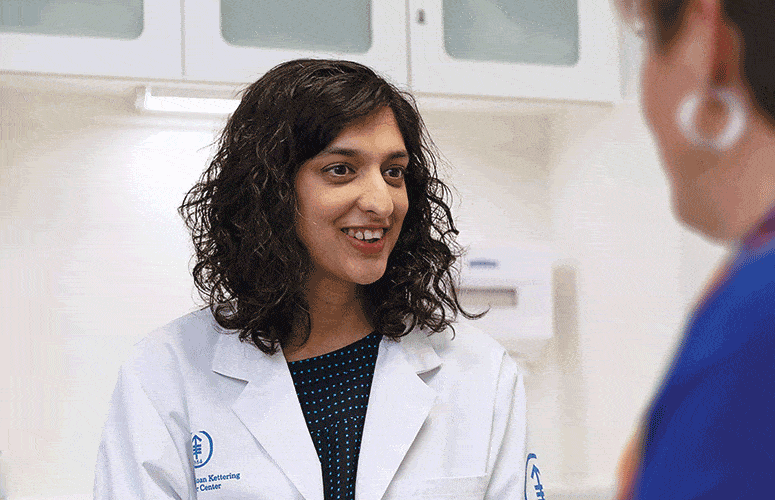
Hospitals Make Strides in Combating Cancer
On Dec 8, 2022Doctors fighting cancer in New Jersey say the early 2020s are an increasingly optimistic time for care, with recent rapid advancements providing patients better treatment options, fewer serious side effects, and more reasons for hope.
Healthcare systems and facilities like RWJBarnabas, CentraState, Cooper University Health, and Memorial Sloan Kettering Cancer Center are leveraging significant enhancements in areas like molecular testing, targeted cell therapies, and knowledge of immunology to catch cancers early, fight them more efficiently with fewer toxins, and lengthen lives.
At RWJBarnabas, for example, leukemia and lymphoma patients are benefiting from huge oncology strides over the past decade in cell therapy and specifically CAR T-cell therapy, re-engineering these types of immune cells to bind to cancer cells and destroy them.
“We’re doing this for patients who, clearly only five years ago, would [otherwise] not be walking the face of this earth,” says Dr. Ira Braunschweig, chief of the Transplant and Cell Therapy Service of the RWJBarnabas Health Oncology Service Line. “It is curing patients who really had no good options a short time ago.”
The stakes are enormous for Garden State residents.
New Jersey, with a long industrial history and derisively dubbed by some as “Cancer Alley,” has been plagued with high cancer rates for generations.
New Jersey and West Virginia are tied for the nation’s second highest rates of cancer with 482.4 cases per 100,000 people, trailing only Kentucky, according to WorldPopulationReview.com, citing recent U.S. Centers for Disease Control (CDC) statistics. New York lists at fourth highest.
The American Cancer Society estimates that in 2022 there will be 1.9 million new US cancer cases and 609,360 fatalities, the nation’s second leading cause of death behind heart disease.
Dr. Braunschweig says breakthroughs in treating leukemia and lymphoma are driven by “advances in the knowledge of immunology” to help destroy cancer cells.
“So, it’s really the realization of decades of research to try to harness the immune system and to make it an effective cancer therapy,’’ he says.
Stem cell transplantation also has seen advances via the use of half-match donors to treat patients with hematological malignancies. Until recently, patients needed a matched sibling or fully matched unrelated donor, but they can now, for example, rely on a child or parent to provide a half match.
“That really has opened up the availability and opportunity for these patients, because you’d be surprised how many patients don’t have a matched sibling, or even don’t have any potential donors on the national marrow donor list,” Dr. Braunschweig says.
At Cooper University Health’s Janet Knowles Breast Cancer Center, specialists are supplementing regular annual mammograms for patients at higher risk by utilizing 3D mammograms or tomography and MRIs to provide better views of breast tissue.
“The capture rate for potential malignancy is higher,’’ says Dr. Kahyun Yoon-Flannery, co-director and breast surgeon at the Knowles Center.
Patients with dense breast tissue are receiving a screening ultrasound on the same day, saving them time and exposure to additional radiation, Dr. Yoon-Flannery explains.
“We’ve found this to be incredibly valuable in making cancer diagnosis a little earlier for dense-breast patients,’’ she says.
For those with cancer, Cooper is utilizing targeted therapies or immunotherapy for patients who meet key criteria, as well as molecular testing to determine the risk of recurrence and tailor further treatment by determining whether chemotherapy is needed.
“The treatment of cancer is really continuing to evolve to be more personalized. It is more individualized cancer treatment than how it used to be, where we were just removing it all and everybody gets chemotherapy,’’ Dr. Yoon-Flannery says.
At Statesir Cancer Center at CentraState in Freehold, efforts are ongoing to build a major endocrine program to address thyroid, parathyroid and adrenal cancer care.
“We’re really in the midst of a major development in endocrine surgery that includes research, multiple clinical trials, developing sub-specialty programs for endocrine disease like MEM syndrome, and others,’’ says Dr. Alexander Itskovich, the center’s director and an advanced gastrointestinal surgeon.
Statesir at CentraState also specializes in pancreatic screening, which now is only possible in extremely high-risk individuals, who can obtain yearly tests to help catch abnormalities in a pre-cancerous or early Stage 1 state.
Typically, Dr. Itskovich says, general patients diagnosed with pancreatic cancer have only a roughly 25% chance of having a tumor removed even after chemotherapy.
“Whereas in a screening program, if it’s diagnosed, more than 80% of cancers generally are able to be removed, and obviously that portends a much better prognosis,’’ he explains.
Dr. Itskovich says that, in the future, catching cancer recurrence early is in the realm of molecular level work that can create a specialized blood test from a small piece of a patient’s tumor.
At Memorial Sloan Kettering Cancer Center in Basking Ridge, the focus also is increasingly on efforts to understand specific biological and clinical traits of a person’s cancer to tailor treatments beyond chemotherapy, if possible.
“We try to do a comprehensive evaluation of a patient’s tumor type involving standard pathologies, but then also more sophisticated molecular diagnostics like targeted sequencing where we look at the DNA within the cancer cells,’’ says Dr. Anita Kumar, medical site director at MSK in Basking Ridge and an oncologist with a background in treating lymphoma patients.
Doctors then study specific genes known to drive the growth of cancer cells and check for mutations.
“Sometimes, we can identify biologically targeted therapies that may be even more effective than standard chemotherapy, and associated with substantially less toxicity, and allow for maintaining a patient’s quality of life better,” Dr. Kumar continues.
She expresses awe at cancer care advances: “I think that’s so humbling, and it feels like such a privilege to be part of a field where … there’s so many advances happening in terms of the science and therapies being developed. … We have a lot more to offer to people.’’
To access more business news, visit NJB News Now.






